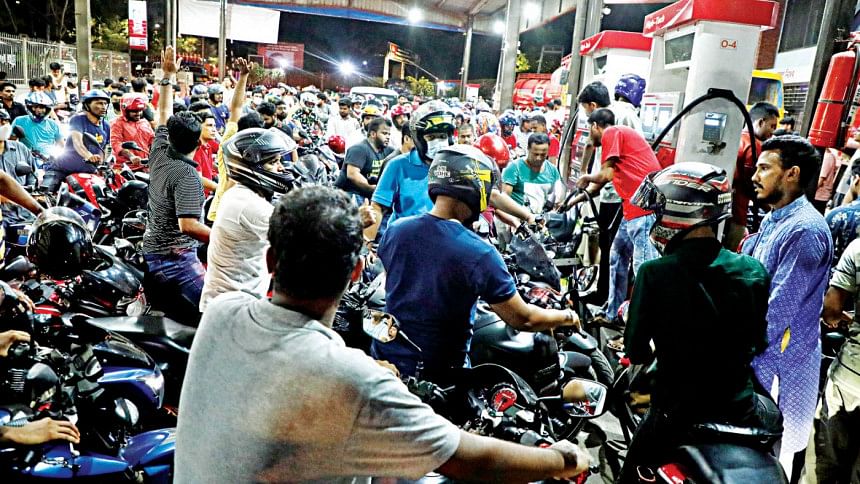Record hike in fuel prices

The government last night hiked fuel prices by up to 51.7 percent, the highest in the country's history, adding to the plight of common people already struggling to cope with the rising cost of living.
As per the new prices that took effect at 12:00am today, a litre of octane now costs Tk 135, which is 51.7 percent higher than the previous rate of Tk 89.
Similarly, each litre of petrol now costs Tk 130, a rise of Tk 44 or 51.1 percent, said a press release from the Ministry of Power, Energy and Mineral Resources, stating that the prices have been raised as fuel prices in the international market are a lot higher than that in Bangladesh.

The price of each litre of diesel and kerosene has reached Tk 114 from Tk 80.
Bangladesh Petroleum Corporation (BPC) had counted a loss of Tk 8,014.51 from February to July by selling fuel at low prices, said the press release.
Due to the rising prices of fuel in the international market, it said, many countries, including India, have already raised fuel prices.
In Kolkata, each litre of diesel has been sold for Rs 92.76 (Tk 114.09) per litre and petrol Rs 106.03 (Tk 130.42) since May 22. Until yesterday, petrol and diesel were Tk 34.09 and Tk 44.42 cheaper in Bangladesh, said the release.
Concern over smuggling of fuel out of the country was another reason behind the hike, it added.
The highest-ever increase since the country's independence comes at a time when people are already finding it hard to cope with rising prices of essentials.
As the news spread, hundreds of people thronged the refuelling stations across the country, hoping to buy fuel before the new rates took effect. But the station authorities stopped selling fuels, causing furore among the people.
Last week, the government hiked prices of urea fertiliser by 37.5 percent to Tk 22 per kg, a blow to farmers, many of whom suffered losses from recurring floods and low crop yields this year.
Experts say the hike in the fuel prices will cause further inflation, increasing transport fare, prices of daily essentials, and the production cost of goods. This means the lower income group would have to further tighten their belts.
"The price hike is undoubtedly the highest since independence. This will put extreme pressure on the economy… Countless people will be pushed into poverty," said energy expert Dr M Tamim.
"Had the government continued to provide subsidies as usual, the price would not have exceeded Tk 100," the Buet professor told The Daily Star last night.
"The fuel price in the global market is declining and the prediction is that it will continue [till the end of the year].
"I do not know whether the government has hiked the price to reduce the subsidy… Maybe the IMF loan [that Bangladesh has sought] has a big role here, because the first and foremost condition to get an IMF loan is not to give any subsidy on fuel.
Khondaker Golam Moazzem, research director at the Centre for Policy Dialogue (CPD), said the hike in fuel prices will further drive up already-high inflation.
"This is not the right time. The hike will increase transport and irrigation costs. We have already seen a hike in urea prices. The latest increase in diesel price will push up farming cost," he said.
"The real income of consumers has been falling for soaring prices. The increase in petroleum prices and its eventual effect on prices of goods and services will worsen their situation."
The government last hiked diesel price in November 2021 from Tk 65 to Tk 80.
And subsequently, transport operators -- bus owners and truckers -- raised fares, which ultimately affected the people trying to recover from the Covid-induced economic shock.
Petrol price was last hiked in January 2013 by Tk 7 to Tk 96 a litre and the octane price by Tk 5 to Tk 99 a litre. The prices of both, however, were slashed by Tk 10 a litre in April 2016.

 For all latest news, follow The Daily Star's Google News channel.
For all latest news, follow The Daily Star's Google News channel. 



Comments